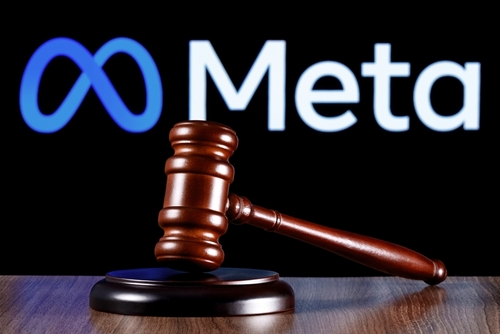Stanford Law prof fires Meta as client, citing platform's 'descent into toxic masculinity'

A professor at Stanford Law School announced on LinkedIn on Monday that he could no longer “in good conscience” represent Meta, the parent company of Facebook and Instagram. (Image from Shutterstock)
Updated: A professor at Stanford Law School announced on LinkedIn on Monday that he could no longer “in good conscience” represent Meta, the parent company of Facebook and Instagram.
Mark Lemley, the William H. Neukom professor of law at Stanford Law and director of its Program in Law, Science and Technology, said in his social media post he has “struggled with how to respond to [CEO] Mark Zuckerberg and Facebook’s descent into toxic masculinity and Neo-Nazi madness.”
Lemley, a partner at Lex Lumina who was representing Meta in a copyright dispute in the Northern District of California, said he fired the company as a client. The case, Kadrey v. Meta Platforms, involves allegations that Meta trained its artificial intelligence product using the copyrighted works of several authors.
Law.com, Bloomberg Law, Business Insider and SFGate have coverage.
Lemley said on LinkedIn he considered quitting Facebook but has found “great value” in connecting with friends on the platform. He added that “it doesn’t seem fair that I should lose that because Zuckerberg is having a midlife crisis.”
Along with firing Meta, Lemley said he deactivated his Threads account and will no longer make purchases based on Facebook or Instagram ads.
In a statement published by Law.com on Wednesday and also sent to the ABA Journal on Thursday, Lemley said he decided to fire Meta after Zuckerberg took “a series of steps” in the past week “to encourage disinformation and hate speech on the platform, to target LGBTQ members on the site and at the company, and to encourage a culture of toxic masculinity.”
Meta announced that it would end its third-party fact-checking programs in the United States and change its hateful conduct policies. The company also said it was ending its diversity, equity and inclusion programs.
Michael Frisch, an adjunct professor at the Georgetown University Law Center who’s also the school’s ethics counsel, told Law.com that it isn’t ethically inappropriate for a lawyer to terminate representation of a client, as long as it doesn’t harm the client.
However, Frisch also said, there have been cases in which lawyers have been sanctioned for being publicly critical of a client or a former client.
“I don’t find it ethically questionable that the lawyer decided to withdraw,” Frisch told Law.com. “I think the lawyer seeking publicity or making public statements negative about the client raises potential ethics concerns.”
Updated Jan. 16 at 2:03 p.m. to reflect that Mark Lemley sent his Wednesday statement published by Law.com to the ABA Journal.



